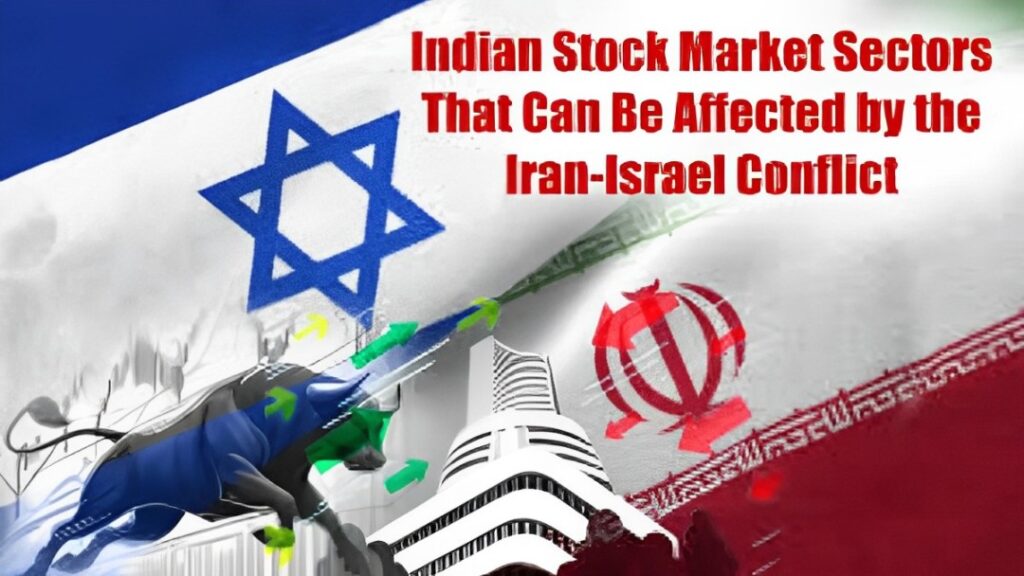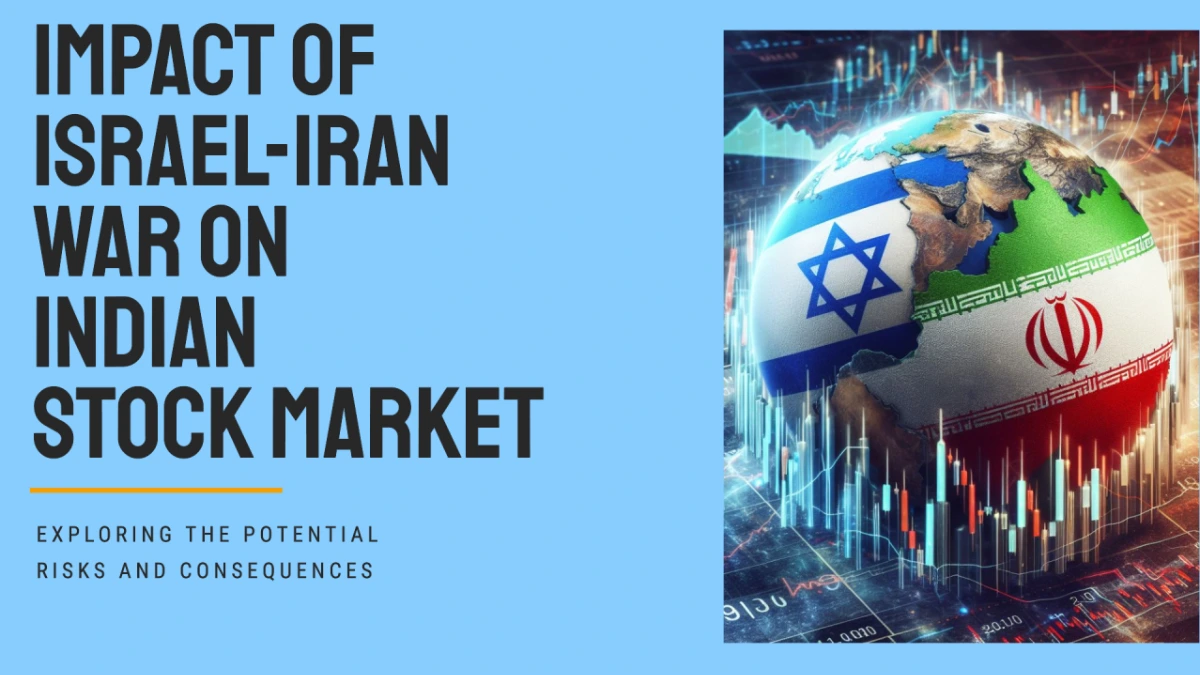The Middle East has always been a volatile region with persistent geopolitical tensions. However, the escalating Iran-Israel war could lead to unprecedented consequences, especially for global economies heavily reliant on oil imports, such as India. For Indian investors, the ongoing war might feel distant geographically, but its effects are rippling through Dalal Street, creating significant uncertainty. Understanding these impacts is crucial for navigating the stock market in these turbulent times.
As the conflict deepens, India faces the double-edged sword of surging oil prices and deteriorating foreign investor sentiment. This article explores the Impact of Iran Israel War on the Indian Stock Market, focusing on key sectors and providing practical insights for Indian investors.
Table of Contents
How Global Geopolitical Tensions Affect Indian Markets
Geopolitical events have historically played a significant role in market dynamics. For instance, during the Gulf War, crude oil prices skyrocketed, leading to inflationary pressures that destabilized global economies. Similarly, the recent conflict between Russia and Ukraine caused energy prices to soar, further dampening global growth prospects.
The Iran-Israel war is no different. As one of the major oil-producing regions, any instability in the Middle East sends shockwaves through the energy markets, driving up oil prices and affecting countries heavily reliant on oil imports—like India. But it’s not just about oil. Geopolitical conflicts often result in capital outflows from emerging markets as foreign investors seek safer havens.
Crude Oil Prices: The Central Force Behind Market Volatility
India’s reliance on imported crude oil means that fluctuations in global oil prices have direct consequences on the economy. The Iran-Israel war is already causing a surge in crude oil prices as fears of supply disruptions escalate. According to recent reports, Brent crude prices have risen steadily, nearing $80 per barrel(mint).
This rise in oil prices hits India’s fiscal health in multiple ways. First, higher oil import bills increase the current account deficit, adding pressure to the Indian rupee. Secondly, the cost of production for industries dependent on fuel increases, leading to inflationary pressures that can erode corporate profits. Sectors such as aviation, transport, and manufacturing bear the brunt of this cost-push inflation, making Indian equities less attractive to global investors.
Investor Sentiment: Foreign Investment Flows and Capital Outflow Risks
Foreign portfolio investors (FPIs) play a crucial role in the Indian stock market. In 2023, FPIs poured over ₹1 lakh crore into Indian equities, boosting market sentiment(mint). However, geopolitical instability, such as the Iran-Israel war, could reverse this trend, prompting foreign investors to pull out of riskier markets.
Historically, FPIs tend to reduce their exposure to emerging markets during geopolitical tensions, preferring safer assets like U.S. bonds or gold. If the conflict escalates, India could witness significant FPI outflows, leading to a sharp correction in stock prices.
Sector-wise Impact of Iran Israel War on the Indian Stock Market

IT Sector: Indian IT Companies and Their Exposure to Global Markets
India’s IT companies, such as Infosys, Wipro, and TCS, have significant exposure to international markets, including the Middle East. With the war disrupting normal business operations, IT service contracts and revenues from this region could be affected, leading to a short-term dip in earnings. Moreover, any global economic slowdown caused by the war could dampen demand for IT services.
Oil and Gas Sector: Dependency on Oil Imports
India’s dependency on crude oil imports makes the oil and gas sector highly sensitive to global price movements. Companies like Reliance Industries, ONGC, and Indian Oil Corporation are directly impacted by crude price volatility. While higher oil prices may benefit oil explorers like ONGC, refiners and marketing companies could face margin pressure due to rising input costs.
Banking and Financial Sector: How War Disruptions Can Lead to Market Corrections
The banking sector is highly exposed to market volatility. Any sharp corrections in stock prices or changes in foreign exchange rates can impact credit risk, liquidity, and foreign exchange earnings. Additionally, higher inflation caused by rising oil prices may force central banks to adopt tighter monetary policies, further affecting interest rates and banking sector profitability.
Gold vs Equities: A Shift to Safe-Haven Investments
Historically, during periods of geopolitical tension, investors tend to shift from equities to safe-haven assets like gold. Gold has always been considered a hedge against inflation and uncertainty. As global markets remain volatile due to the Iran-Israel conflict, gold prices are likely to rise further, offering a safe harbor for risk-averse investors
Defensive Stocks: Opportunities in Volatile Times
During market downturns, defensive stocks in sectors like FMCG, healthcare, and utilities typically perform well. These sectors are less sensitive to economic cycles and tend to provide stable returns even during geopolitical crises. Investors looking to shield their portfolios from volatility should consider reallocating to these sectors.
Domestic Investors’ Role in Stabilizing Indian Markets
Despite the potential outflow of foreign capital, domestic institutional investors (DIIs) have consistently played a stabilizing role in the Indian stock market. Over the years, domestic investors have stepped in to offset foreign outflows, helping to maintain market stability during times of crisis. This dynamic is expected to continue, offering some degree of protection against large-scale market corrections.
Conclusion: Navigating the Storm – What Indian Investors Should Do
The Iran-Israel war presents significant risks for the Indian stock market, particularly in sectors like IT, oil, and banking. However, investors should not panic. Instead, it’s crucial to remain informed, maintain a diversified portfolio, and consult with financial advisors to navigate this challenging environment.
For those looking to minimize risk, focusing on safe-haven assets like gold or defensive stocks could be a prudent strategy. In the long term, the Indian stock market has shown resilience in the face of global crises, and this time should be no different. The key is to stay informed, remain patient, and make calculated investment decisions.
FAQs Related to iran israel war impact on indian stock market
Impact of Iran Israel War on Indian Economy
The Iran Israel war could lead to a surge in global oil prices, which directly affects India as a major oil importer. Rising oil costs could increase inflation, widen the current account deficit, and negatively impact sectors like transportation and manufacturing, thereby slowing down economic growth in India.
Iran Israel War Latest News
The latest updates on the Iran-Israel conflict suggest escalating tensions with missile strikes and retaliatory actions. This has caused global concern, leading to fluctuations in stock markets and a rise in crude oil prices, impacting economies worldwide.
Iran-Israel War Reason
The conflict stems from deep-rooted geopolitical tensions, primarily centered on ideological, political, and territorial disputes. Israel views Iran as a security threat due to its nuclear ambitions and support for anti-Israeli militias like Hezbollah. Iran, on the other hand, opposes Israel’s existence and influence in the region.
Impact of Israel War on Stock Market
Geopolitical tensions like the Iran-Israel war generally lead to market volatility. Stock markets in regions with close economic ties to these countries, especially those dependent on oil, could experience sharp corrections. Investors often move toward safe-haven assets like gold during such conflicts.
Israel War Impact on Market in India
The Israel war’s impact on the Indian market is primarily through rising crude oil prices and foreign investor sentiment. Indian sectors such as IT, oil, banking, and manufacturing could face pressure due to higher input costs and potential capital outflows from the stock market.
Iran Stock Market Today
The Tehran Stock Exchange has seen increased volatility due to the ongoing conflict, as investors react to geopolitical uncertainties and potential sanctions. The Iranian economy, already strained by sanctions, could face further challenges if the war escalates.



